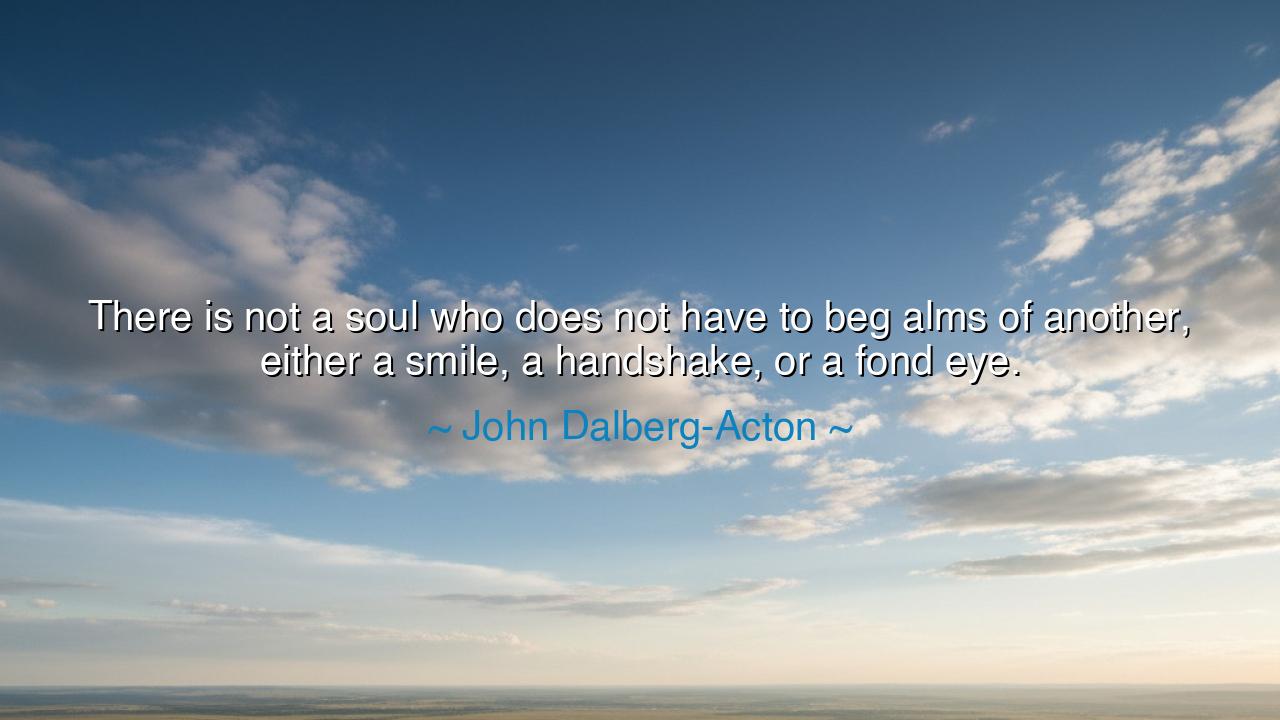
There is not a soul who does not have to beg alms of another
There is not a soul who does not have to beg alms of another, either a smile, a handshake, or a fond eye.






The words of John Dalberg-Acton carry a wisdom as gentle as it is profound: “There is not a soul who does not have to beg alms of another, either a smile, a handshake, or a fond eye.” In these lines, he does not speak of coin or bread, but of the currency of the spirit. Every human being, no matter how mighty or lowly, must one day seek sustenance not in wealth, but in the warmth of smiles, the clasp of handshakes, the tenderness of a fond eye. Here lies an eternal truth: that we are creatures made for one another, and our deepest hunger is for connection.
The meaning of this saying rests in the recognition of universal dependence. The proud king, robed in power, longs still for the approving glance of his people. The scholar, alone with his books, yet seeks the smile of a friend who understands. The laborer, weary from toil, draws strength not only from wages but from a gentle word at the end of his day. Acton strips away the illusions of independence and reminds us that every soul begs alms, not of gold, but of affection, acknowledgment, and love.
The ancients knew this hunger well. Consider Diogenes the Cynic, who cast aside possessions and mocked the vanity of wealth. He begged for food in the streets, but more than food, he sought respect, or at least recognition, from those who passed him by. Even the philosophers, who claimed self-sufficiency, still yearned for the “alms” of attention and dialogue. For man is not made to stand apart like stone; he is woven into the fabric of others, and without their touch, he withers.
History bears many witnesses to this truth. Abraham Lincoln, weary from the weight of civil war, once confessed that he found comfort in the letters of ordinary people. A simple note from a farmer’s wife, telling him that she prayed for him, became to him more precious than treasures. In those moments, he was not the mighty President, but a man begging for alms—a word, a blessing, a kind thought—to steady his spirit. This is the humility Acton reveals: that no one is beyond the need for kindness.
The origin of this wisdom lies in the human condition itself. From birth, the infant begs for alms with its cry, and the mother gives with a smile or a caress. In youth, we beg of our companions the alms of laughter and inclusion. In age, we beg of the young the alms of patience and respect. At every stage, our survival and flourishing depend upon the unseen charity of others, often given freely, sometimes withheld. To acknowledge this is not weakness—it is truth.
The lesson for us is luminous: be generous with the alms of the heart. Do not withhold your smile, your handshake, your glance of affection. You may think them small, yet they may be the very sustenance for a weary soul standing at the edge of despair. In practice, this means greeting others with kindness, speaking encouragement, offering recognition where none is expected. These simple acts cost nothing, yet they enrich both giver and receiver.
So let Acton’s words echo as a commandment for daily living: remember that all beggars walk the earth, clothed in many garments. The powerful beg silently, the humble beg openly, but all beg alike. Meet them with compassion. For in giving such alms, you yourself will one day receive them, and in this exchange the chain of humanity is made unbroken.
Thus, children of tomorrow, carry this truth: no soul is self-sufficient, and no act of kindness is wasted. To smile, to clasp hands, to look with warmth—these are deeds as mighty as charity of gold. Scatter them freely, for you too shall one day beg them, and in that moment, may the world return to you the alms of the heart, abundant and overflowing.






AAdministratorAdministrator
Welcome, honored guests. Please leave a comment, we will respond soon